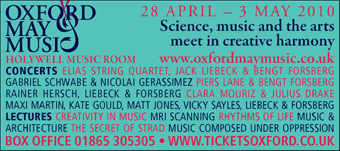May 9, 2010
Clara Mouriz & Julius Drake, Oxford May Music Festival 2010
Holywell Music Room, Sun 2 May 2010
I arrived at the Holywell Music Room with very few expectations for the evening’s entertainment, being no more than a fan of good singing and a willing guinea pig for most musical experiences. I am aware that a Mezzo Soprano is a level of classical singing voice, but there ended my knowledge. Holywell Music Room, Sun 2 May 2010
Clara Mouriz, rather than fitting my image of an operatic diva, buxom, overly made up, melodramatic in delivery, was slender and elegant, compact and bijou enough to fit snugly into the curve of the grand piano’s side. (This is not to say that she hid away - more that she and the instrument made an attractive couple!) As she began the first of the pieces, a cantata by Haydn, she stepped forward and as much acted the piece as sang it, demonstrating that a part of the performance is in the singer’s gesture and expression, which in this case seemed convincingly heartfelt.
The power of her voice, easily reaching the limits of her range with note perfect precision and depth of tone, belied the expected capabilities of such a petite frame.
Clara’s real skill however, lay in her ability to sing the quietest of notes with such clarity and finesse that it actually made me shiver a little. Admittedly, I am pretty easily moved when it comes to the human voice, but I sensed that others in the audience felt that the power of the performance was in the purity of those moments. I looked around me to see smiles of appreciation and pleasure. A bonus for me was that many of the songs were in French, a language I am fortunate to understand and love to hear spoken and, I discover, sung. Clara quite clearly enjoyed the singing of many songs in her native Spanish, ending jubilantly on an uplifting note with a couple of what I would describe as more fun and animated numbers.
I enjoy a performer all the more when they engage with their audience, which Clara and her accompanist Julius Drake certainly did - Julius being the more vocal of the pair, introducing the songs and explaining their context. It was when Clara told us about the pieces that she endeared herself, and thus her performance, to us most however.
If I had any negative criticism to make it would be of the error on the part of the organisers to distribute printed lyric sheets to the audience. The intention was kind, but the result was a perpetual, slight paper rustling, page-turning accompaniment to every song. Maybe my ears were super-tuned on that night to pick up on and be disturbed by even the tiniest distraction, but I felt that Clara Mouriz sang beautifully and expressively enough that the understanding of the meaning of the words should have been irrelevant. Stop reading, listen and enjoy!




